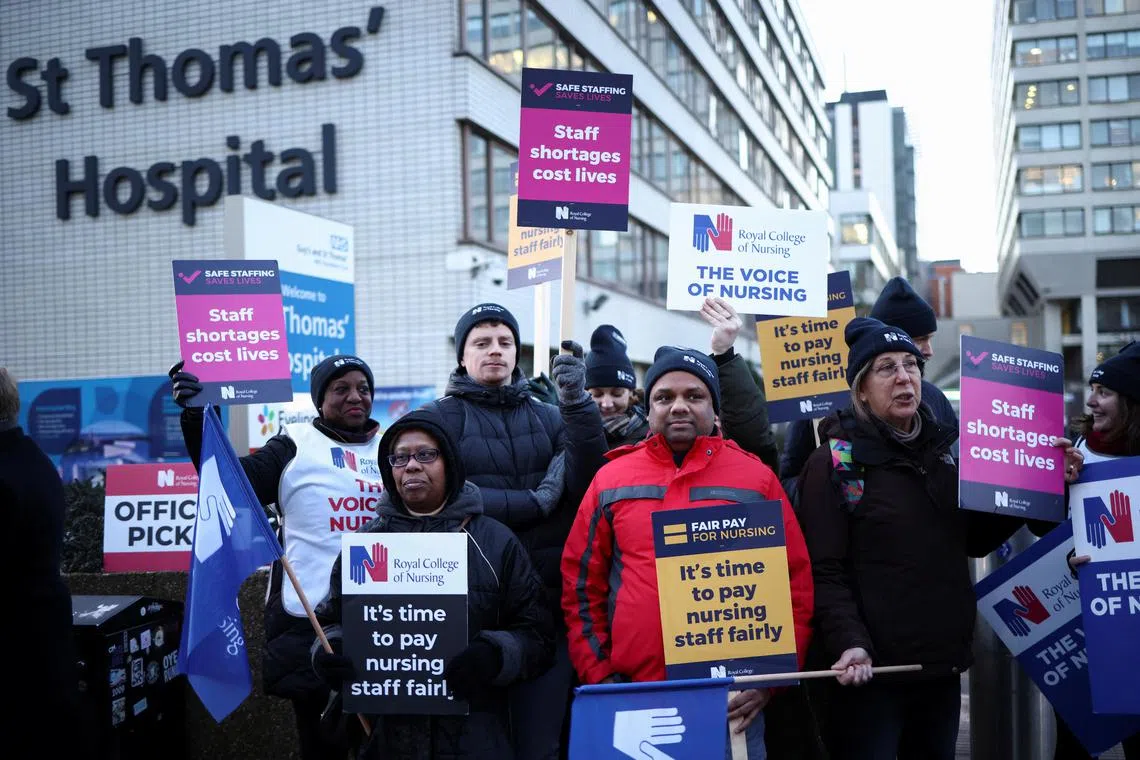'What a tragic day': Some 100,000 British nurses strike in bitter pay dispute
Sign up now: Get ST's newsletters delivered to your inbox

NHS nurses strike outside St Thomas' Hospital in London, Britain, on Dec 15, 2022.
PHOTO: REUTERS
LONDON – National Health Service (NHS) nurses in Britain staged a strike on Thursday, their first-ever national walkout
An estimated 100,000 nurses went on strike at 76 hospitals and health centres, cancelling an estimated 70,000 appointments, procedures and surgical operations in Britain’s state-funded NHS.
“When I started nursing, you wouldn’t be rich but you’d get decent pay,” Ms Mary Smith, who moved to the UK from Ireland, said. She added that some of her colleagues were now resorting to food banks.
“At the end of every month, there’re nurses that are taking food from the patients’ cupboard and we’re not supposed to do it – nobody wants to. But by the last week before they get paid, if they don’t have enough money, they take the beans from the cupboard and eat that.”
Britain is facing a wave of industrial action this winter. Inflation running at more than 10 per cent, trailed by pay hike offers of around 4 per cent, is stoking tensions between unions and employers.
Baggage handlers at London’s Heathrow Airport planned to go on a strike on Friday and the weekend, but decided to suspend it after their company, Menzies Aviation, made an improved pay offer, said UK’s Unite labour union, which will ballot members on the new offer. Industrial action planned over New Year’s Eve will still go ahead pending the result of the ballot, the union said.
Of all the strikes though, it will be the sight of nurses on picket lines that will be the standout image for many Britons this winter.
“What a tragic day. This is a tragic day for nursing, it is a tragic day for patients, patients in hospitals like this, and it is a tragic day for people of this society and for our NHS,” Ms Pat Cullen, the head of the Royal College of Nursing (RCN) union, said to the BBC on a picket line on Thursday.
The widely admired nursing profession will shut down parts of the NHS, which since its founding in 1948 has developed national treasure status for being free at the point of use.
It is hitting healthcare provision when it is already stretched in winter and with backlogs at record levels due to Covid-19 delays.
Secretary of State for Health and Social Care Steve Barclay said it was deeply regrettable that the strike was going ahead.
“I’ve been working across government and with medics outside the public sector to ensure safe staffing levels – but I do remain concerned about the risk that strikes pose to patients,” he said.
He added patients should continue to seek urgent medical care and attend appointments unless they have been told not to.
Prime Minister Rishi Sunak said on Wednesday that the government has “consistently spoken to all unions involved in pay disputes”. He added that it had responded to nurses’ requests for more training and money for nursing students, while also awarding them a pay rise last year when the pay of other public sector workers was frozen.
Mr Keir Starmer, leader of the opposition Labour Party, said the walkouts were a “badge of shame” for the government.
More strikes ahead?
The industrial action by nurses on Thursday and next Tuesday
The government has refused to discuss pay, which Ms Cullen said raised the prospect of more strikes. “Every room I go into with the Secretary of State, he tells me he can talk about anything but pay,” she said. “What it is going to do is continue with days like this.”
Outside St Thomas’ Hospital in central London, Ms Ethnea Vaughan, 50, a practice development nurse from London, said she felt nurses had no option but to strike, blaming a government that had ignored their concerns for years.
“Nothing is changing and I’ve been in nursing for 27 years and all I can see is a steady decline in morale,” she told Reuters.
The government in Scotland avoided a nursing strike by holding talks on pay, an outcome that the RCN had hoped for in England, Wales and Northern Ireland.
But the government has said it cannot afford to pay more than the 4 to 5 per cent offered to nurses, which was recommended by an independent body, and that further pay increases would mean taking money away from front-line services. Some treatment areas will be exempt from strike action, the RCN has said, including chemotherapy, dialysis and intensive care.
Polling ahead of the nursing strike showed that a majority of Britons support the action, but once the walkouts are under way politicians will be closely monitoring public opinion.
REUTERS, BLOOMBERG


